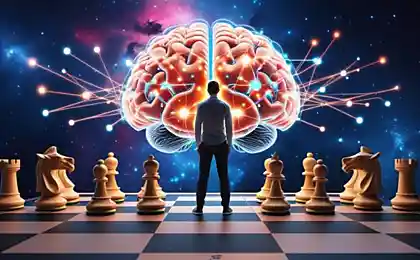545
Tacit knowledge: why our mental activity is not always clear to us
Our confidence in that we know the world directly, perceiving the facts, philosophers referred to "naive realism». Beliefs about many aspects of the surrounding world are formed out of many thought processes that are impossible to track, and often are fundamentally wrong. Recently published a book by Professor of psychology University of Michigan Richard Nisbett "Motostroitel: How to learn how to think, using the techniques from different Sciences."
Publish an excerpt about the value of an interdisciplinary approach in science and our ability to learn to think logically.
"In the old days, when we often had to measure the land, it made sense to require that almost every student entering the College, knew a bit of trigonometry. Today it is more important basic knowledge of probability theory, statistics and the analysis of decision-making".
Lawrence summers, former President of Harvard University
Seventy six million five hundred eighty two thousand two hundred fifty seven
The idea to write this book was born because of my deep belief that discoveries in one field of science can be extremely useful in other disciplines. In academic circles, the very popular word "interdisciplinary". I'm pretty sure that many of those who like to use that word, can't really explain what is so good interdisciplinary approach to scientific research. But it's really good and here's why.
Science is often described as the "seamless network". This means that any facts, methods, theories, and rules that are logical conclusions drawn in one area can be applied in any other field of science. And the laws of philosophy and logic affect on building logical chains of virtually every scientific field.
Field theory in physics has given impetus to the creation of field theory in psychology. Physicists working on elementary particles, using statistics collected for psychologists. Scientists studying agriculture, have implemented statistical methods, proved extremely important for psychologists-behaviorists.
Invented by psychologists theory about how to teach a rat to pass the maze, led to the fact that experts in the field of computer science decided to teach computers to think.
The theory of natural selection Darwin came largely thanks to the theories of the Scottish philosophers of the XVIII century on the social system, especially the theory of Adam Smith that the public good is always the result of the pursuit of individual members of society for their own selfish interests.
In our days, economists are increasingly interested in intelligence and self-control people. Ideas about how people make choices, has changed in light of the studies of cognitive psychologists and experimental methods used by social psychologists, has expanded the Toolkit of economic research.
Modern sociologists largely owe to the philosophers of the XVIII–XIX centuries, which put forward various theories of the nature of society. Cognitive and social psychology expands the range of questions raised by the philosophers, and begins to give answers to the mysteries, which occupied the philosophers for centuries. Philosophical reflections on ethics and theory of knowledge help research in psychology and Economics. Research in neurobiology and the ideas of this science have an impact on psychology, Economics and even philosophy.
Explaining someone's behavior, we often ignore situational factors and overestimate personal
Here are some examples from my own practice, showing how big can be the application of scientific ideas in one area of knowledge to another.
I studied social psychology, but most of my early research works were connected with the theme of eating behaviour and obesity. When I started to work, society, including scientists and doctors believed that people gain weight because eat too much. In the end, it became obvious that the majority of overweight people overeat because you really feel a strong feeling of hunger. Psychologists studying the problem of obesity, borrowed the term "constant value" from the concept of homeostasis (e.g., the human body always tries to maintain the set temperature). Obese person a constant value of fat relative to body tissues is much higher than a person with normal weight. But social stereotypes force them to lose weight, which leads to the fact that such people are chronically starving.
Another problem that I studied was the people's understanding of the reasons for the behavior of others and themselves. Field theory in physics urged the researchers to conduct the study, which showed that situational factors and environment often play a more important role in human behavior than such personal aspects as traits, abilities and preferences. Thanks to this concept it becomes clear that, by choosing causal relationships, which we try to explain someone's behavior- their own, others, or even some inanimate objects, we often ignore situational factors and overestimate personal factors.
Seven million nine hundred forty two thousand twenty six
© Akatre
By studying these explanations, I realized that in most cases, we will superficially present the reasons for his behavior and does not analyze their own thought processes. This work is relevant to the question of identity was carried out largely thanks to Michael Polanyi, the scientist-chemist, known for his work on the philosophy of science. He believed that the greatest part of our knowledge, even those that relate to matters in which we understand and with which we work — and perhaps especially this knowledge is "implicit (tacit or personal) knowledge" that are difficult or impossible to formulate in words.
Conducted by me and other scientists of the study of self-analysis has questioned the correctness of the reports of subjects about their thought processes and reasons for their own behavior. This work changed the methods of evaluation in psychology and throughout the behavioral and social science. In addition, the study convinced some students that self-report about his motives and purposes to rely, as a rule, it is impossible — and not because people tend to embellish their actions and shield themselves, but because our mental activity is not always clear to ourselves.
Errors in self-reports, made me wonder about the accuracy of our inferences in principle. Turning to the work of cognitive psychologists Amos Tversky and Daniel Kahneman, I compared conclusions presented subjects with scientific, statistical and logical standards and found that people are systematically mistaken in their logical conclusions. These findings are often at odds with the principles of statistics, Economics, logic and scientific methodology.
The study of these phenomena psychologists have influenced the views of many philosophers, economists and politicians. In the end, I conducted a study that showed that people in East Asian and Western countries sometimes perceive the world in fundamentally different way. In this study, I was guided by various ideas of philosophers, historians and anthropologists. I came to the conclusion that the features of Asian thinking which is called dialectic, can give Western culture are powerful tools for the development of thinking, in the same way as Western thinking for centuries helped to develop civilizations of Asia.
Scientific and philosophical thinking can be taught — and this will affect daily life
The study of logical thinking has greatly influenced my own ability to think logically in everyday life. I am continually reminded that many of the concepts are transferred from one science to another, influenced my approach to professional and personal matters. At the same time, I constantly find myself on the fact that I not always get to apply the tools of logical thinking, which I research and teach. Naturally, I began with a question, does the education on our way of thinking in everyday life.
At first I doubted that any item, or otherwise associated with logical thinking, can affect people as well as influenced me the ideas that I've had for a long time. I experienced typical of twentieth century skepticism about the possibility of learning logical thinking
I have never been so far from the truth. It turned out that studying in tertiary institutions do affect the ability to withdraw conclusions about the world and often affects very much. The rules of logic, statistical principles such as the law of large numbers and regression to the mean; the principles of scientific methodology — such as forming a control group to confirm the cause-and-effect relationships; the classic economic laws and the theory of decision-making all influence the way people think about problems in their daily lives. Yes, it affects how people talk about sports, and how, in their opinion, should take on the work and dismiss it, and even to think about such trifles as the need to eat tasteless dish.
We cannot normally perceive forming impressions about the person as a statistical process, but in reality it is exactly what happens
Since some University courses significantly improve the ability to think logically in daily life, I decided to try to teach such ideas. With my colleagues we have developed methods of teaching the rules of logical thinking, which helps to make inferences about personal and professional issues of a General nature. As it turned out, people were willing to learn something new on these short lessons.
A study of the concept of law of large numbers has affected the ability to build a chain of reasoning about what proof is needed to make the unmistakable conclusion about a person or an object. The study of the economic principle of the price reduction choice affect how people manage time. Most of all we liked the results of a survey of participants a few weeks after training under the guise of public opinion research by phone. We happily discovered that many of the respondents retained the ability to put into practice studied in the classroom concept.
And most importantly, we figured out how to maximize the scope of the regulation to logical thinking in everyday life. It is possible to master a set of principles of construction of logic chains in a particular area and not be able to apply them when faced with problems in practice. However, the principles of logical thinking can be made more accessible and useful. The main thing is to understand how to imagine the events so that the principles of the solution of the problems are obviously applicable to them, and how to code events so that these principles can be applied to them in practice.
Also interesting: the Stored thoughts: a large part of human knowledge — the search in the cache
We KNOW more than we think
We cannot normally perceive forming impressions about the person as a statistical process, like the measurement sample of some of the events — but in reality it is exactly what happens. The perception of their own experiences in this way helps to refrain from inadvertently attributing to others any qualities, but also to predict their future behavior.
P. S. And remember, just changing your mind — together we change the world! ©
Source: theoryandpractice.ru/posts/14041-mindware
Publish an excerpt about the value of an interdisciplinary approach in science and our ability to learn to think logically.
"In the old days, when we often had to measure the land, it made sense to require that almost every student entering the College, knew a bit of trigonometry. Today it is more important basic knowledge of probability theory, statistics and the analysis of decision-making".
Lawrence summers, former President of Harvard University
Seventy six million five hundred eighty two thousand two hundred fifty seven
The idea to write this book was born because of my deep belief that discoveries in one field of science can be extremely useful in other disciplines. In academic circles, the very popular word "interdisciplinary". I'm pretty sure that many of those who like to use that word, can't really explain what is so good interdisciplinary approach to scientific research. But it's really good and here's why.
Science is often described as the "seamless network". This means that any facts, methods, theories, and rules that are logical conclusions drawn in one area can be applied in any other field of science. And the laws of philosophy and logic affect on building logical chains of virtually every scientific field.
Field theory in physics has given impetus to the creation of field theory in psychology. Physicists working on elementary particles, using statistics collected for psychologists. Scientists studying agriculture, have implemented statistical methods, proved extremely important for psychologists-behaviorists.
Invented by psychologists theory about how to teach a rat to pass the maze, led to the fact that experts in the field of computer science decided to teach computers to think.
The theory of natural selection Darwin came largely thanks to the theories of the Scottish philosophers of the XVIII century on the social system, especially the theory of Adam Smith that the public good is always the result of the pursuit of individual members of society for their own selfish interests.
In our days, economists are increasingly interested in intelligence and self-control people. Ideas about how people make choices, has changed in light of the studies of cognitive psychologists and experimental methods used by social psychologists, has expanded the Toolkit of economic research.
Modern sociologists largely owe to the philosophers of the XVIII–XIX centuries, which put forward various theories of the nature of society. Cognitive and social psychology expands the range of questions raised by the philosophers, and begins to give answers to the mysteries, which occupied the philosophers for centuries. Philosophical reflections on ethics and theory of knowledge help research in psychology and Economics. Research in neurobiology and the ideas of this science have an impact on psychology, Economics and even philosophy.
Explaining someone's behavior, we often ignore situational factors and overestimate personal
Here are some examples from my own practice, showing how big can be the application of scientific ideas in one area of knowledge to another.
I studied social psychology, but most of my early research works were connected with the theme of eating behaviour and obesity. When I started to work, society, including scientists and doctors believed that people gain weight because eat too much. In the end, it became obvious that the majority of overweight people overeat because you really feel a strong feeling of hunger. Psychologists studying the problem of obesity, borrowed the term "constant value" from the concept of homeostasis (e.g., the human body always tries to maintain the set temperature). Obese person a constant value of fat relative to body tissues is much higher than a person with normal weight. But social stereotypes force them to lose weight, which leads to the fact that such people are chronically starving.
Another problem that I studied was the people's understanding of the reasons for the behavior of others and themselves. Field theory in physics urged the researchers to conduct the study, which showed that situational factors and environment often play a more important role in human behavior than such personal aspects as traits, abilities and preferences. Thanks to this concept it becomes clear that, by choosing causal relationships, which we try to explain someone's behavior- their own, others, or even some inanimate objects, we often ignore situational factors and overestimate personal factors.
Seven million nine hundred forty two thousand twenty six
© Akatre
By studying these explanations, I realized that in most cases, we will superficially present the reasons for his behavior and does not analyze their own thought processes. This work is relevant to the question of identity was carried out largely thanks to Michael Polanyi, the scientist-chemist, known for his work on the philosophy of science. He believed that the greatest part of our knowledge, even those that relate to matters in which we understand and with which we work — and perhaps especially this knowledge is "implicit (tacit or personal) knowledge" that are difficult or impossible to formulate in words.
Conducted by me and other scientists of the study of self-analysis has questioned the correctness of the reports of subjects about their thought processes and reasons for their own behavior. This work changed the methods of evaluation in psychology and throughout the behavioral and social science. In addition, the study convinced some students that self-report about his motives and purposes to rely, as a rule, it is impossible — and not because people tend to embellish their actions and shield themselves, but because our mental activity is not always clear to ourselves.
Errors in self-reports, made me wonder about the accuracy of our inferences in principle. Turning to the work of cognitive psychologists Amos Tversky and Daniel Kahneman, I compared conclusions presented subjects with scientific, statistical and logical standards and found that people are systematically mistaken in their logical conclusions. These findings are often at odds with the principles of statistics, Economics, logic and scientific methodology.
The study of these phenomena psychologists have influenced the views of many philosophers, economists and politicians. In the end, I conducted a study that showed that people in East Asian and Western countries sometimes perceive the world in fundamentally different way. In this study, I was guided by various ideas of philosophers, historians and anthropologists. I came to the conclusion that the features of Asian thinking which is called dialectic, can give Western culture are powerful tools for the development of thinking, in the same way as Western thinking for centuries helped to develop civilizations of Asia.
Scientific and philosophical thinking can be taught — and this will affect daily life
The study of logical thinking has greatly influenced my own ability to think logically in everyday life. I am continually reminded that many of the concepts are transferred from one science to another, influenced my approach to professional and personal matters. At the same time, I constantly find myself on the fact that I not always get to apply the tools of logical thinking, which I research and teach. Naturally, I began with a question, does the education on our way of thinking in everyday life.
At first I doubted that any item, or otherwise associated with logical thinking, can affect people as well as influenced me the ideas that I've had for a long time. I experienced typical of twentieth century skepticism about the possibility of learning logical thinking
I have never been so far from the truth. It turned out that studying in tertiary institutions do affect the ability to withdraw conclusions about the world and often affects very much. The rules of logic, statistical principles such as the law of large numbers and regression to the mean; the principles of scientific methodology — such as forming a control group to confirm the cause-and-effect relationships; the classic economic laws and the theory of decision-making all influence the way people think about problems in their daily lives. Yes, it affects how people talk about sports, and how, in their opinion, should take on the work and dismiss it, and even to think about such trifles as the need to eat tasteless dish.
We cannot normally perceive forming impressions about the person as a statistical process, but in reality it is exactly what happens
Since some University courses significantly improve the ability to think logically in daily life, I decided to try to teach such ideas. With my colleagues we have developed methods of teaching the rules of logical thinking, which helps to make inferences about personal and professional issues of a General nature. As it turned out, people were willing to learn something new on these short lessons.
A study of the concept of law of large numbers has affected the ability to build a chain of reasoning about what proof is needed to make the unmistakable conclusion about a person or an object. The study of the economic principle of the price reduction choice affect how people manage time. Most of all we liked the results of a survey of participants a few weeks after training under the guise of public opinion research by phone. We happily discovered that many of the respondents retained the ability to put into practice studied in the classroom concept.
And most importantly, we figured out how to maximize the scope of the regulation to logical thinking in everyday life. It is possible to master a set of principles of construction of logic chains in a particular area and not be able to apply them when faced with problems in practice. However, the principles of logical thinking can be made more accessible and useful. The main thing is to understand how to imagine the events so that the principles of the solution of the problems are obviously applicable to them, and how to code events so that these principles can be applied to them in practice.
Also interesting: the Stored thoughts: a large part of human knowledge — the search in the cache
We KNOW more than we think
We cannot normally perceive forming impressions about the person as a statistical process, like the measurement sample of some of the events — but in reality it is exactly what happens. The perception of their own experiences in this way helps to refrain from inadvertently attributing to others any qualities, but also to predict their future behavior.
P. S. And remember, just changing your mind — together we change the world! ©
Source: theoryandpractice.ru/posts/14041-mindware























